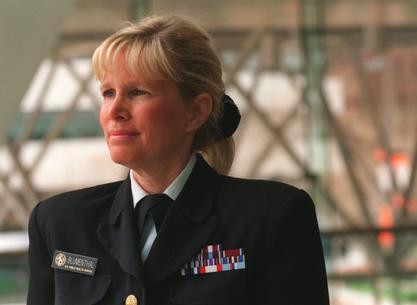Accomplishments
CONTRIBUTIONS TO ADVANCING NATIONAL AND GLOBAL HEALTH
For more than two decades, Rear Admiral Susan Blumenthal, M.D. served in senior leadership positions within the U.S. Federal Government working as a career medical officer in the Administrations of four Presidents of the United States. A hallmark of Dr. Blumenthal’s work has been the early identification of understudied public health problems and the ability to bring these issues to increased public and scientific attention. She is the recipient of several honorary doctorates and many awards for her work and was recently decorated with the highest medal of the United States Public Health Service for “distinguished and pioneering leadership, groundbreaking contributions, and dedicated public service that has improved the health of women, our Nation and the world.” She was also named the 2009 Health Leader of the Year by the Commissioned Officers Association. Today, Admiral Blumenthal continues her public health leadership in research, education and policymaking on national health, women’s health, prevention, AIDS, and other global health issues. Among her significant contributions to advancing health in the United States and internationally include:
WOMEN’S HEALTH
Dr. Blumenthal played a pioneering leadership role in moving women’s health issues to the forefront of our nation’s health care agenda and have made significant contributions to advancing this field.
Susan Blumenthal, M.D., M.P.A. served as the country’s first Deputy Assistant Secretary for Women’s Health in the U.S. Department of Health and Human Services (HHS) and as Director of the HHS Office on Women’s Health. She was appointed to this position in recognition of her work in the 1980s’s exposing the inequalities in women’s health including the lack of focus on sex differences in health and disease, and in recognition of the pressing need in the early 1990’s to develop initiatives across the Federal government to address a broad spectrum of issues to improve the health of women. This – first of its kind- senior level health post was established to shine a national spotlight on women’s health. During her service in this position, national attention and funding for women’s health increased dramatically. Dr. Blumenthal coordinated a comprehensive national program of over $4 billion (an increase of 30% in four years) in research, policy, service delivery and education initiatives across agencies of the U.S. Department of Health and Human Services (including NIH, CDC, SAMSHA, FDA, HRSA, AHQR, and CMS). In this position, she forged numerous partnerships with other departments of government, consumer and health care professional organizations, and private industry to advance women’s health both domestically and internationally. She also served as an advisor to the White House on women’s health. Numerous cross-cutting initiatives were implemented during her tenure and a national infrastructure for women’s health policy and programs was established that no one federal agency or health organization could have accomplished alone, including:
- Established a national infrastructure for women’s health and developed a range of policies in the HHS agencies and regions to advance women’s health. She appointed and funded the first women’s health regional coordinators in the US Department of Health and Human Services and convened the first regional and state conferences for women’s health coordinators and organizations.
- Mobilized, for the first time, all agencies of government to work on women’s health by establishing and chairing Federal coordinating committees across government departments on critical women’s health issues to foster trans-agency collaborations and initiatives. She work to ensure that women’s health coordinators were appointed in all of the Federal health agencies
- Established a comprehensive women’s health public policy agenda to address research, education, services, and prevention issues. Partnered with a broad range of federal, state, and private sector organizations and the media to develop and implement this agenda.
- Served as an advisor to the White House on women’s health including traveling and working with the First Lady on breast cancer and other women’s health issues, and speaking at White House events with the President and First Lady. Worked with the First Lady and Health Care Financing Administration to ensure that Medicare and Medicaid provided coverage for screening mammography and to develop an educational outreach campaign on the lifesaving benefits of this imaging technology;
- Served as Public Health Advisor to the White House Domestic Policy Council.
- Conducted pioneering work in applying information technology to improve health. Envisioned, built and implemented the award winning National Women’s Health Information Center, the first website in the government for health, that provides a single user friendly point of access to thousands of Federal and private sector information resources on women’s health through a toll free telephone number (800-994-WOMAN) and on the internet (4woman.gov and womenshealth.gov) before many agencies had this information available online; Established several other award winning health information website portals including the first for college women’s health, 4collegewomen.org; nutrition.gov, safeyouth.org and global health.gov.
- Envisioned and established the National Centers of Excellence on Women’s Health initiative at 18 academic medical centers across the country to serve as national models for “one stop shopping” in women’s health care, fostering multidisciplinary research and developing medical education curricula on women’s health. Established and chaired several committees of center directors on research, education, and leadership issue for women in academic medicine;
- Co-chaired and directed the implementation of the National Breast Cancer Action Plan, a Presidential initiative, that stimulated new public/private partnerships and innovative programs to fight this disease involving over 200 participants;
- Established and chaired a Federal Coordinating Committee on Breast Cancer involving representatives of all Cabinet Departments and federal agencies.
- Spearheaded the unique “Missiles to Mammograms” initiative that transferred CIA, NASA and DOD imaging technology used for missile and target recognition to improve the early detection of breast cancer and other diseases in women with computer assisted diagnosis as well as established and chaired the first Federal committee to identify and transfer technologies from other governmental agencies and fields to improve health care. See New Frontiers in Breast Cancer Imaging and Early Detection: From Missiles to Mammograms, 1994 and New Frontiers in Breast Cancer Imaging and Early Detection: From Missiles to Mammograms, 1996;
- Established and directed the Healthy Women 2000 initiative, a national public education campaign and Capitol Hill Conference series to ensure that national disease research, prevention and education efforts whether to prevent smoking, to encourage physical activity and to promote a healthy diet targeted the unique needs of women. Convened major conferences on heart disease, Alzheimer’s, cancer in women, autoimmune disease, reproductive health, smoking in adolescent women, nutrition, physical activity, and menopause related issues among others. Convened diverse groups of experts and a wide range of attendees including policymakers, NGO’s, Ambassadors, members of Congress and the media.
- Provided leadership in negotiations with the FDA to ensure that women were included in clinical trials and that data was analyzed for sex differences.
- Developed a national mentoring program and student internship program to foster the career development of women in the health professions and in academic medicine;
- Developed a minority women’s health initiative to rectify the health disparities that exist for women of color and ensure health equality for all; Convened the first major Federal conference on minority women’s health issues.
- Designed national education campaigns with representatives from government, NGO’s, the media and businesses on eating disorders, obesity, osteoporosis prevention, and the first government partnership with the Girl Scouts–a smoking prevention merit badge program announced at the White House;
- Established a National Task Force on Women and AIDS involving over 80 organizations which built on the foundation of earlier work in the 1980’s organizing the first Federal conference on behavior change strategies for AIDS prevention in women;
- Established a heart disease in women initiative. Convened a major conference and worked with the American Heart Association to develop the first television documentary on women and heart disease. Worked to increase public and health care professional education and primary and secondary prevention services for women through policy changes and education programs.
- Created a focus on nutrition and obesity in women. Convened a first Federal conference on nutrition and physical activity in women. Contributed to the Surgeon General’s Call to Action to Prevent Obesity. Serve as the Chair of Save the Children National Advisory Council on Childhood Obesity Prevention.
- Developed initiatives to target the health of girls, adolescents and college women;
- Established programs on domestic violence, co-chaired the HHS Steering Committee on Domestic Violence and established partnerships with medical and legal organizations to develop national prevention and intervention strategies;
- Established a focus on health care reform and health services research including planning for a conference on Managed Care and Women’s Health. Participated in the White House Health Reform Task Force.
- Ensured that the Healthy People 2010 objectives for the nation included a focus on women and sex differences in health and disease.
- Created a focus on environmental factors contributing to disease in women and established and chaired a Federal committee to examine environmental effects on women’s health.
- Established a focus on global women’s health issues. Served as the U.S. representative on international collaborations in women’s health; convened and chaired conferences with Canada, Mexico, and in the Middle East, and served as the United States delegate to the WHO Global Commission on Women’s Health and as a member of the President’s Council on Women.
GLOBAL HEALTH
- Dr. Blumenthal served as Senior Global Health Advisor in the Office of Global Health Affairs within the Office of the Secretary, US Department of Health and Human Services and was involved in the national public health response to terrorism, emergency preparedness, and emerging disease threats including the anthrax attacks, SARS, avian flu and AIDS. In this position, she established several international health diplomacy collaborations including a Middle East Health Initiative. The Office of Global Health Affairs represents the Department to other governments, other Federal Departments and agencies, international organizations, and the private sector on international and refugee health issues. The Office develops U.S. global health policy and strategy positions and facilitates the involvement of the U.S. Public Health Service in collaborations with other agencies and organizations. The Office also promotes cooperation by the PHS Operating Divisions with the U.S. Agency for International Development (USAID) and provides leadership and coordination for bilateral programs with selected countries
- Dr. Blumenthal served as the U.S. representative on international collaborations in women’s health; convened and chaired conferences with Canada, Mexico, and in the Middle East; and was the United States delegate to the WHO Global Commission on Women’s Health and as a member of the President’s Council on Women.
- Dr. Blumenthal serves as Senior Policy and Medical Advisor to AmfAR (the Foundation for AIDS Research)
- Dr. Blumenthal leads the health diplomacy initiatives at the Center for the Study of the Presidency, including a USAID funded program to promote health activities between Israel and the Palestinian Territories.
BEHAVIORAL MEDICINE, MENTAL ILLNESS AND SUICIDE RESEARCH
Another major focus of Dr. Blumenthal’s career has been on mental health and disease and violence prevention. For 12 years at the National Institutes of Health (1980-1993), as Chief of the Behavioral Medicine and Basic Prevention Research Branch, as Head of the Suicide Research Unit at the National Institute of Mental Health and as Chair of the NIH Health and Behavior Coordinating Committee, her work focused on mental illness and suicide research and education and on the creation of a national focus on disease prevention and behavioral medicine. Her scientific and educational contributions greatly advanced NIMH and NIH research programs in these areas integrating behavioral approaches into the fabric of all NIH institutes and also significantly increased awareness and knowledge about the causes, treatments, and real life impact of mental illness.
- In 2001, at the request of the Secretary, US Department of Health and Human Services, she led the development and coordination of a Departmental action plan to address the mental health needs of children affected by the terrorist attacks against our nation. Many of the recommendations of this plan have been implemented by HHS agencies. She developed public education materials on the mental health effects of terrorism, convened and chaired a national conference, and worked with senior federal, state, and local health officials to identify and design intervention strategies to promote recovery and resiliency.
- She was an architect of the HHS Healthier US public education campaign on disease prevention.
- Dr. Blumenthal serves as the Chair of Save the Children’s CHANGE National Advisory Council on Childhood Obesity Prevention.
- She served as Senior Public Health Advisor to the White House Council on Youth Violence, contributing to the coordination of the Federal response to this public health problem, which had previously been fragmented across agencies, fostering new initiatives, and collaborations between government agencies. She established and served as the Medical Director of the National Youth Violence Prevention Resource Center.
- In 1992, Dr. Blumenthal was appointed by the Director of the NIH to serve as Co-Chair of the NIH Transition Task Force that fostered reintegration of the research components of the former Alcohol, Drug Abuse, and Mental Health Administration (ADAMHA) – the National Institute of Mental Health, the NIAAA, and the National Institute on Drug Abuse – into the NIH family. She provided leadership in increasing attention to prevention, behavioral medicine, and health services research at the NIH and coordinated research on health and behavior across NIH institutes and centers. Dr. Blumenthal developed initiatives and programs to foster research and to heighten scientific and public awareness of mental illness and also, the contributions of disease prevention and of behavioral, lifestyle and environmental factors in the etiology, treatment and prevention of diseases including heart disease, cancer, stroke, and diabetes. She coordinated nutrition and sleep disorders research at the NIMH and served as a member of the National Commission on Sleep Disorders Research. During her NIH service, she provided leadership in exposing the inequities in women’s health research and stimulated new initiatives on gender differences in health and disease and career development and leadership opportunities for women in academic medicine.
- She possesses more than twenty years of experience in prevention research and education. Dr. Blumenthal served as Chief of the Basic Prevention and Behavioral Medicine Research Branch at the National Institute of Mental Health. In this position, she developed and administered a research program focusing on disease prevention, the biological and psychosocial correlates influencing the development and course of medical illnesses, behavioral problems, and disorders including eating disorders, sleep disorders, pain, heart disease, diabetes, stroke, and health damaging behaviors. She identified critical public health issues, developed new initiatives and then coordinated research programs within the NIMH. To stimulate research, she organized and chaired numerous NIMH conferences on suicide, AIDS, eating disorders, women’s mental health issues, genetics, stress, sleep disorders, chronic fatigue syndrome, and co-morbidity of mental and physical illnesses.
- Initiated and chaired the first Federal conference on Women and AIDS. Focused scientific attention on AIDS in women, a population that had not been a focus of national efforts until that time.
- Stimulated research on gender differences in HIV infection.
- Was the major force at the NIMH in initiating new federal initiatives on the examination of gender differences in mental illness. Stimulated research on the psychobiology of female reproductive events across the life cycle, convened numerous conferences and edited books on these issues.
- Convened a major conference to reexamine the field of behavioral medicine and set new research directions. This document provided the foundation for new research initiatives at NIH on disease prevention.
- Fostered new research on eating disorders, convened several conferences and stimulated research initiatives on this public health problem.
- Fostered the emerging field of psychoneuroimmunology, stimulating new research, convening conferences and disseminating information through conferences and monographs. Organized and chaired the first Mind/Body conference at the NIH with a major focus on disease prevention. Co-edited a book on psychoneuroimmunology.
- Played a major national role in bringing women’s health issues to the fore. Developed a national research agenda at the NIMH on these issues. Contributions were a major force in raising awareness about the exclusion of women from clinical trials and in promoting the examination of gender related differences in research within the NIMH, NIH and nationally.
- In the 1980’s, Dr. Blumenthal served as the Head of the Suicide Research Unit and Coordinator of Project Depression at the National Institute of Mental Health. At a time when there was only minimal scientific and public attention to the public health problem of suicide, she initiated a national suicide research and prevention program at the NIMH. Dr. Blumenthal stimulated the systematic study of the biological, behavioral, and psychological factors that contribute to suicidal behavior. She was among the first to address suicide as a public health problem emphasizing the importance of the early detection and treatment of mental illness as a cornerstone of suicide prevention. She developed a new model for understanding suicidal behavior, significantly increasing research and prevention programs on this public health problem, and edited a major book, Suicide over the Life Cycle. Dr. Blumenthal served as a national spokesperson and the NIMH’s leading expert on suicide research and prevention educating the public and health care professionals about this public health problem. She served as medical director for a videodisc on the assessment of suicidal behavior for health care providers and contributed to the work of the Secretary’s Task Force on Youth Suicide. Dr. Blumenthal convened and chaired numerous conferences, developed research initiatives, and fostered scientific and public attention to increase knowledge and to prevent suicide.
- Dr. Blumenthal served as Coordinator of Project Depression, the precursor of the NIMH’s Depression Awareness and Treatment Campaign, the first national education campaign on clinical depression. She collaborated with mental health consumer and health care professional groups to develop national campaigns to destigmatize mental illness and to educate health care providers and the public about the causes and treatment of mental disorders.
HEALTH INFORMATION TECHNOLOGY
- Dr. Blumenthal was at the forefront in the Federal government of applying technology to improve health. She envisioned and directed the development and implementation of several award-winning national resources that provide a centralized point of access to a wealth of health information in the Federal government and private sector through easy to use, toll-free telephone numbers and internet sites. Long before most government agencies had their information online, conceptualized and established the National Women’s Health Information Resource Center located at 800-994-WOMAN and www.4woman.org. Envisioned and directed the National Youth Violence Prevention Resource Center (launched in a Presidential radio address) located at 866-SAFEYOUTH and www.safeyouth.org in collaboration with the CDC and other Federal departments that provides a single point of access to information, fact sheets, research opportunities and other resources on this public health issue.
- Created and directed www.nutrition.gov, an award-winning internet portal to information about nutrition, physical activity, food safety, nutrition assistance programs, and biotechnology. Was appointed by the Assistant Secretary for Health to serve as the Chair of the Consumer Information Technology Integration Initiative for the Office of Public Health and Science to evaluate current state of information technology and develop a coordinated approach to these resources.
- Evaluated and enriched globalhealth,gov, strengthening it to become a major portal for comprehensive information resources on global health.
- Envisioned and spearheaded the unique “Missiles to Mammograms” initiative involving the Director of the CIA, the Administrator of NASA and the Director of the Army’s Medical Research Command, in an innovative program that transferred CIA, NASA, and DOD imaging technology used for missile and target recognition and space exploration to improve the early detection of breast cancer. This initiative has resulted in software that provides computer-assisted diagnosis of breast cancer, increasing the accuracy of mammography. It is currently being used in medical centers across the country to the benefit of millions of American women.
- Established and chaired a Federal committee and convened many national conferences to identify and transfer technologies from government agencies and other fields to improve the diagnosis, treatment and prevention of disease including fostering telemedicine and distance learning.
EDUCATION AND COMMUNICATION
- Admiral Blumenthal served as a national spokesperson on health issues briefing Heads of States, Health Ministers, and testifying before Congress as well as appearing as a medical expert on national television and radio news programs. She served as the Medical Director of a Discovery Channel/American Film Institute Global Health Documentary Festival, as a Medical Advisor to PBS, and as the Host and Medical Director for an award winning television series on health.
- Dr. Blumenthal established several public and health care provider education campaigns on depression, panic disorder, and women’s health issues.
- She is a committed and effective educator and valued mentor for undergraduate, public health and medical students. Admiral Blumenthal serves as a Clinical Professor of Psychiatry at Georgetown and Tufts Schools of Medicine. Additionally, she has served as the Lila Wallis Distinguished Professor of Women’s Studies at Cornell School of Medicine, as the Distinguished Visiting Professor of Women’s Studies at Brandeis University, as the Bundy Visiting Professor and Elizabeth Blackwell Lecturer at the Mayo Clinic, as Visiting Professor at Stanford University in Washington and as a Fellow at Harvard University School of Government.
- Dr. Blumenthal has received many awards and medals including honorary doctorates for her outstanding leadership and distinguished contributions to improving health in the United States. She has been named by the New York Times as one of the top twelve doctors in the women’s health field and by the Medical Herald as one of the twenty most influential women in medicine.
- Dr. Blumenthal has authored numerous publications and edited several books including Suicide over the Life Cycle. She served as the Scientific Editor of the Surgeon General’s Call to Action to Prevent Suicide and contributed to the Surgeon General’s Call to Action on Obesity Prevention. She serves on editorial boards of journals including the Journal of Women’s Health, and has written the health columns for U.S. News and World Report and Elle magazines.
- Dr. Blumenthal’s leadership and contributions to improving women’s health and to advancing national and global health have been recognized with numerous awards including honorary doctorates and the highest medals of the United States Public Health Service. She has been named by the New York Times and by the Medical Herald as one of the most influential and important women in medicine.








